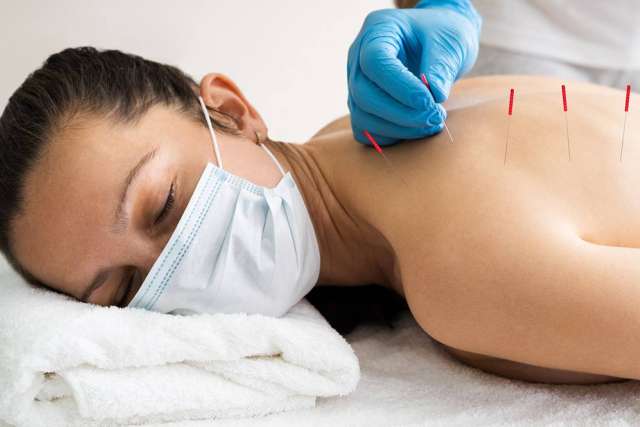Cancer treatments often cause pain and uncomfortable side effects that can last well beyond the final treatment. To manage that pain, many people turn to acupuncture, a method of traditional Chinese medicine (TCM).
According to TCM, pain stems from a blockage in the body’s flow of energy (called qi). Acupuncture balances the flow of energy and relieves pain by addressing specific pressure points on the body (called acupuncture points or acupoints).
“Acupuncture is a very useful tool for managing cancer side effects,” says , an integrative oncology specialist at the . “It focuses on restoring the energy flow that cancer treatments disturb.”
How does acupuncture work?
During acupuncture, a trained practitioner applies needles, heat, pressure or other treatments to strategic points on your body. The stimulation of those spots can release your body’s natural painkillers, increase blood flow and reduce inflammation.
During the most common form of acupuncture, an acupuncturist inserts long, thin needles (slightly thicker than a human hair) into your body. When the needles are heated, electrically charged or manipulated by hand, the body’s nervous system responds. It releases neurotransmitters (such as endorphins or serotonin) which work to relieve pain.
Acupuncture for cancer-related pain
Acupuncture works as part of an integrative approach to cancer. Integrative oncology is patient-centered cancer care that uses mind and body practices, natural products, and lifestyle modifications alongside conventional cancer treatments.
The benefits of acupuncture for people with cancer include:
Relieving the side effects of cancer treatment
Every person responds to cancer treatment differently. If the treatment damages healthy cells, the result can be side effects ranging from mild to severe. Finding ways to manage treatment side effects is important. When symptoms are under control, you’ll enjoy a better quality of life and remain on schedule with your treatments.
Acupuncture offers a natural remedy for side effects that may eliminate the need for narcotics or other medications. According to the National Cancer Institute, studies show acupuncture can relieve a wide range of symptoms associated with cancer treatments, including:
- Dry mouth, caused by radiation therapy
- Fatigue, common in many cancer patients and often a side effect of chemotherapy and radiation therapy
- Hot flashes, associated with hormone therapy
- Nausea and vomiting, caused by chemotherapy, surgery and radiation therapy
- Pain, including postoperative pain and muscle and joint pain from hormone therapy
- Peripheral neuropathy, a common side effect of chemotherapy that causes pain, numbness and muscle weakness in the hands or feet
“Just remember there is value in having acupuncture done by a trained internal medicine physician,” Katzin says. “They understand both the intricacies of cancer and what acupuncture can provide.”
Addressing chronic pain in cancer survivors
Almost 35% of cancer survivors experience chronic pain (pain on most days) years after their treatments end. But one out of every two survivors is undertreated for that pain. A recent study shows that acupuncture may offer a solution.
The study involved cancer survivors suffering from chronic musculoskeletal pain (pain in bones, joints, ligaments, tendons or muscles). Participants found more pain relief from acupuncture than from their usual care. The two types of acupuncture studied include:
- Electroacupuncture: Needles are inserted at the point of pain, connected to a mild electric current, and left in place for 30 minutes
- Auricular acupuncture: Small needles are inserted into the ears and remain in place for three to four days
“Acupuncture can be beneficial for patients even after they finish treatment,” Katzin says. “The response is individual, but only a very small percentage of people have no response at all.”
To learn more about acupuncture and how it can relieve your symptoms and cancer-related pain, at the .



